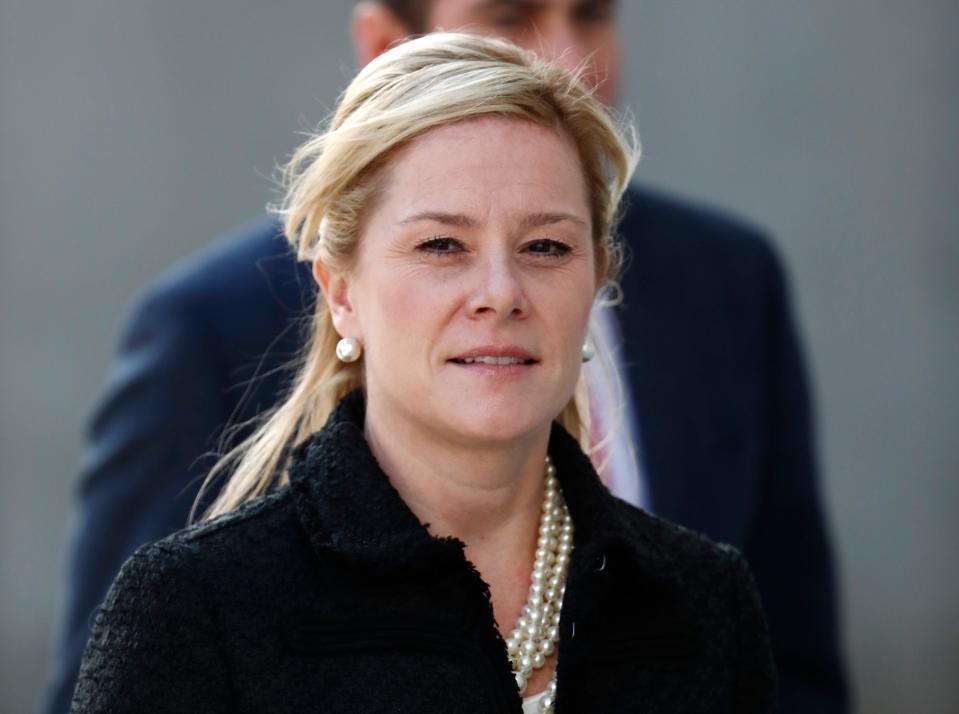Supreme Court will hear New Jersey 'Bridgegate' appeal of Bridget Anne Kelly
The U.S. Supreme Court announced Friday morning that it will hear the appeal of convicted New Jersey "Bridgegate" defendants Bridget Anne Kelly and Bill Baroni, handing the pair a last chance to clear their names and avoid lengthy stays in federal prison.
The high court's review will focus on whether federal prosecutors used criminal fraud statutes to prosecute dishonest political conduct they ordinarily would not pursue.
It’s a significant victory for Kelly, the former deputy chief of staff for ex-Gov. Chris Chistie, and Baroni, a former deputy executive director of the Port Authority. Their previous attempt to convince a judge to dismiss their charges failed in November, when the U.S. Court of Appeals for the 3rd Circuit in Philadelphia threw out two counts but upheld five others, including committing fraud to misuse Port Authority property.

Attorneys will likely make their oral arguments before the court sometime this fall. Justices could issue a decision next spring.
The decision temporarily breathes new life into the nearly six-year-old saga, which started when the Port Authority created a mammoth traffic jam in Fort Lee by blocking several traffic lanes heading to the George Washington Bridge in September 2013.
'I was the lowest-hanging fruit': Bridget Anne Kelly says she was scapegoated by Chris Christie in Bridgegate
What's left to tell? Bridgegate questions will not go away, even if Bridget Anne Kelly goes to prison
A jury convicted Kelly and Baroni three years later of wire fraud, conspiracy and other charges relating to their roles in the plot, which members of the Christie administration and the governor's Port Authority allies hatched to punish Mark Sokolich, Fort Lee's Democratic mayor, for his refusal to endorse Christie's reelection bid that year.
David Wildstein, a Republican political operative, admitted to masterminding the scheme and tapped Kelly for assistance. They cloaked it by saying the lane closures were part of a fictitious traffic study.
Kelly, who is free on bail pending the appeal, faces a 13-month prison sentence. Baroni began serving his 18-month sentence in Pennsylvania’s Loretto Federal Correctional Institution in April.
The appellate court in November upheld the most serious charges against Kelly and Baroni, finding sufficient evidence that the pair deprived the "Port Authority of, at minimum, its money in the form of public employee labor."

But in legal briefs urging the Supreme Court to review the case, Kelly’s attorneys argued that the appellate court said she and Baroni were guilty of serious felonies because they lied about their “real reason” for realigning the lanes. The implications of that are astounding, the attorneys wrote.
“Nothing is easier (or more common) than accusing a politician of advancing his own political interests while purporting to act in the public interest,” the attorneys wrote. “If that suffices to indict, and if a jury finding to that effect suffices to convict, no official in the nation could steer clear of the prosecutorial crosshairs.”
The U.S. solicitor general filed a response brief asking the Supreme Court to refuse the request, citing the appellate court's decision.
The week-long traffic snarl started without warning on Sept. 9, 2013 — the first day of school.
That morning, Wildstein ordered Port Authority workers to cut the bridge's local access lanes from three to one, wreaking havoc on the morning commute to New York City. Before the closures, Kelly, of Ramsey, sent Wildstein an email declaring it was "Time for some traffic problems in Fort Lee."
Bumper-to-bumper traffic flooded side streets feeding the bridge, ensnaring commuters and first responders trying to get to emergencies. The delay made thousands of people late to work.
Wildstein eventually pleaded guilty to federal charges. He was spared prison time in return for cooperating with prosecutors and testifying against Baroni and Kelly. Wildstein was sentenced to three years of probation and ordered to pay more than $20,000 in fines and restitution.
Wildstein testified that he hoped to impress Christie with the traffic jam plot and earn a spot on his presidential campaign. Kelly also took the stand and said that Christie knew about the scheme and gave it his tacit approval. She has since apologized for the email. Christie, however, has denied that he knew anything of the plot. He was never charged.
Email: janoski@northjersey.com
This article originally appeared on North Jersey Record: Supreme Court will hear New Jersey 'Bridgegate' appeal of Bridget Anne Kelly

